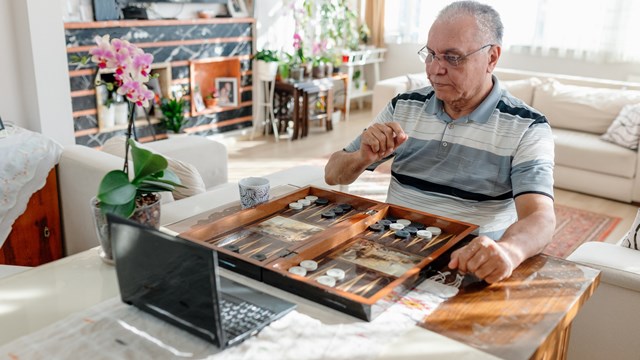
Since the board of a building or community association is usually comprised of a collective group of unique individuals with their own perspective and opinions, no two boards are ever the same. However, there are certain overall, universal qualities that can either make or break a board, and these are traits that everyone involved should follow so things run smoothly.
"One of the first things that makes a board successful is having members that come from diverse personal and professional backgrounds," says Rick Fry, owner of RCP Management in Princeton. "A board that's able to bring a broad variety of ideas, thoughts and suggestions to the table for consideration is always best. You don't want a board of five accountants; it's hard to be creative if everyone thinks alike. If you have a teacher, an engineer, a salesman and an accountant, you will get a much broader array of information brought to the board."
People Who Are People
It's important to realize that the people are the key to having a successful board. If a board has members who don't really want to do work and just wanted to be a member for their own purposes, things aren't going to get done.
"What's important are volunteers who are willing to give the time and participate in the procedures of being on a board," says Jane Balmer, general manager of Rossmoor Community Association in Monroe Township. "There's a lot of time and homework involved."
That homework involves knowing what the hot issues are, preparing for the meetings and wanting to make a difference for the building.
"The qualities a board member on a successful board should have include a true desire to serve the community and looking out for the best interests of the members of the association," says Fry. "You don't want someone who's purely self-serving. People who make successful board members are ones who are truly able to listen to the concerns and views and values expressed by their members. They don't come with a preconceived notion of what the problem is or how it could be resolved. They are effective communicators—which requires effective listening, and naturally effective communication back."
The measure of whether a board member has done a good job isn't too hard to see. All you need to do is compare what has been done since a member joined.
"I guess the barometer you have to use is that the entire community is a better place after you leave," says Brian O'Gibney, general manager of Fairway Mews Community Association in Spring Lake Heights. "That includes financially and aesthetically."
Rules of the House
The structure for how a board runs can vary from board to board. Some are very loose and informal, while others are strict as can be. Usually, the community's documents guide how the board should run.
"We have wonderful governing documents to begin with, which lead us on how to be a good board—and I think that's the key to it," says Balmer. "We use our governing documents, but we do try to follow Robert's Rules as well."
Robert's Rules of Order is a guide to standard parliamentary procedure during business meetings, and what the House and Senate uses, for example, when you watch them on C-SPAN; there are very specific rules involved on how discussions and motions are brought to the floor. It's a formal process that is important for any legislative body, and to which many boards adhere as well.
"The best boards run a very structured, businesslike meeting," says Fry. "At the end of the day, every community is first and foremost a corporation. In a community association, an observance of those formalities is important."
Running Meetings
The setting can also be important. While most boards meet somewhere in the building or community room on a monthly basis, the environment can definitely have an effect on the meeting.
"We have a board room that is made for board meetings," says Balmer. " It has an excellent sound system, the board sits in a U-shape, the audience faces the board, and the meetings always start with an opening statement about something to the effect that we are following all the proper government documents and laws.
"When a matter is introduced for a vote, the board has the right to discuss it, then it's open to the residents before the board votes on it. So, residents have the opportunity to have input before a vote is taken on any matter, and that helps to have a good meeting."
Management Relations
Boards have enough to deal with—they don't want to have a strained or even bad relationship with their managing agent. The board/manager relationship is very important to both sides.
"A critical component of a successful relationship is a very open and honest communication channel in which the board clearly communicates their expectations and provides follow-up and reevaluation as times and circumstances change," Fry says. "They need to evaluate to ensure the management company is meeting those needs, it's really critical."
Trusting one another is also vital. A board that doesn't have faith that a management company will come through with what has been discussed will face problems.
"I'm an on-site manager, and what a good board has to be able to do is hire the best candidate, and have faith in your judgment and that you are going to do a good job," says O'Gibney. "It's important to be firm, fair and consistent."
"The key is always communication," Balmer agrees. "That's No. 1. I think it's management's job to make sure the board is always informed and can make good decisions. Management must follow thorough on policies and decisions that they make."
Keeping the Lights On
A board is responsible for developing policy, ensuring that the services required to run the infrastructure of the building are delivered, and dealing with day-to-day administrative issues that may come up within the association. When problems come up between members of a board or with homeowners, there are standards in place for handling them.
"Depending on the nature of the problem, in New Jersey there is existing statute that requires an association to provide alternative dispute resolution (ADR) hearings for homeowners who don't agree with a policy," says O'Gibney. ADR is required by law, and since it's inception, has saved countless dollars and hours for both HOAs and residents.
The best way to solve any problem is usually to bring the problem to someone else's attention.
"Very few problems get solved by two neighbors fighting over a fence," Balmer says. "Go through the ADR process, or bring in a neutral party so cooler heads can prevail. I don't think a matter between a homeowner and board needs to be public discussion."
Even when a board member is the one creating problems, Fry thinks communication is also the best way to solve that.
"The rest of the board needs to meet behind closed doors and have a heart-to-heart with the disruptive board member and explain the problems and potential consequences of the behavior and ask them to comply," he says. "If it gets to be a renegade situation, most governing documents have provisions for the removal of the board member, either by the board or by a vote of the membership. I do know of boards who have pulled a renegade board member."
Problem Solving
For a board that is struggling, there are ways to get things fixed. The simplest solution may be to bring on different people to the board and have volunteers who are willing to do things the right way.
"Remember, board members are volunteers with other professional lives, so they may not be experts in everything," Fry says. "You can rely on people who are experts with dealing with condo associations or community associations. Though, it really depends on why they are not successful."
O'Gibney says a board can improve by becoming involved with organizations like the Community Associations Institute (CAI), which provides training and education for board members to make them more effective in their responsibilities.
"CAI will help a struggling board," he says. "Everyone doesn't have to agree on everything. If you have a nine-member board that agrees on every single thing, you have problems. It doesn't mean you can't get along and do a great job together—but someone is going to like the Mets, and someone is going to like the Yankees. You need a difference of opinions. That's where professional organizations help."
Keith Loria is a freelance writer and a frequent contributor to The New Jersey Cooperator.






Comments
Leave a Comment